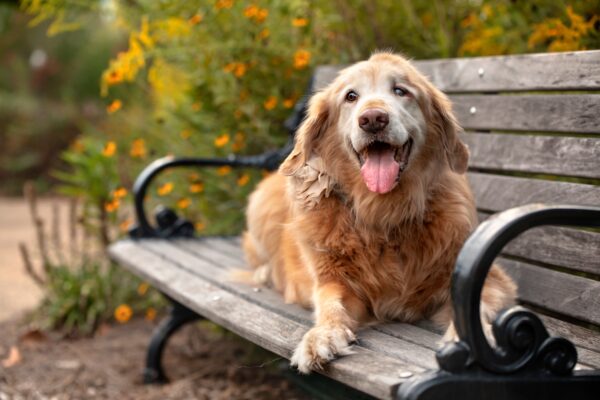How to change a dog’s diet is one of the most common questions dog owners have, especially as their pets age. So we asked our resident vet about the why, what, when and how of senior dog food. Remember, it’s important to discuss any dietary changes with your vet before acting.
Is my dog considered a senior dog?
Different dog breeds age at different rates. Giant breeds such as Great Danes will age quicker than toy and small breeds such as Chihuahuas. For example, giant breeds can be considered senior from as early as 5–6 years old, whilst toy breeds may only be senior and need senior dog food after 11-12 years old. If you’re unsure about how old your dog is and whether or not they’re considered old for their breed, your vet should be able to help.
What is the lifestage of my dog’s current food?
Be it puppy food, adult dog food, or senior dog food, the packaging of your dog’s diet should detail the appropriate age range. This works as a handy tool for knowing when to switch your dog to their next life stage diet. If your dog is eating an adult dog food and they have lapsed the appropriate age to feed it, you should move them on to food for older dogs, such as a mature or senior diet. Here are some tips for choosing the right senior dog food.
Does my dog have arthritis?
If your older dog is showing signs of arthritis, this may be an indicator that you should be feeding a senior dog food. Feeding an age-appropriate diet can help a dog with arthritis at home as some senior dog foods support joint health whilst managing your dog’s weight at the same time. You can combine this change in diet with a bed for dogs with arthritis to fully support your ageing pooch. Although arthritis in dogs is commonly seen in older dogs, it’s important to note that it can affect dogs of all ages. If your dog has arthritis but isn’t in their senior years, a specialist joint care diet may be what they need.
What are the most common age-related problems?
Besides arthritis in dogs, other age-related troubles may indicate a need for food for older dogs. For example, a sensitive stomach, kidneys, or liver may mean transitioning to a sensitive senior dog food with better digestibility or limited protein and phosphorus. Your dog’s appetite may not be as good as it once was, so a senior dog food with better palatability may also help.
What should I do if my senior dog has trouble eating?
If your dog is losing weight and not eating well, he should have a complete veterinary exam to rule out any possible disease. If everything checks out, then you’ll need to take steps to modify your dog’s diet.
Some dogs show a lack of weight gain and disinterest in food as they grow older. That said, if your dog normally eats dry food, he may start eating less because he has a hard time chewing the larger kibble. By feeding a kibble with smaller pieces, moistening the food with water or adding a nutrient-dense canned food you can make the food easier to chew. Adding other foods can increase the appeal, like adding a little water from canned tuna or a small amount of cooked chicken.
Homemade diets of boiled rice, potatoes, vegetables and chicken with correct vitamin and mineral supplements work well with others. You can ask your vet for a suitable homemade diet recipe for your dog. But do not try to formulate one yourself, as the vitamin and mineral levels are critical. Some dogs love to eat cat food, but this should be avoided since it is too high in protein.
Lastly, you might find that dogs with weak legs, stiff joints, or arthritis benefit from raised dog bowls and a non-slip feeding mat to stand on. Here are more tips to help you care for an older pet.



